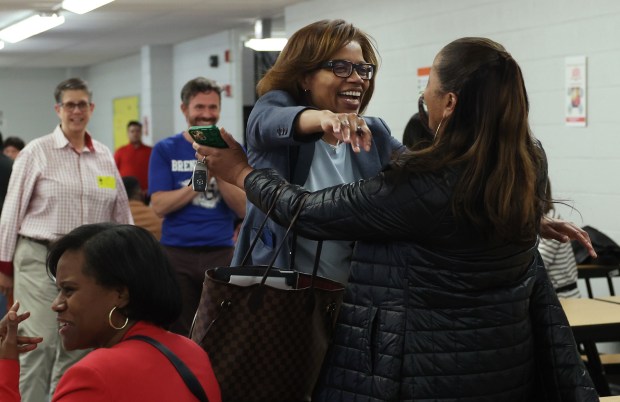The Chicago Board of Education on Wednesday approved Macquline King as interim schools chief, replacing outgoing CEO Pedro Martinez as the search for a permanent leader continues.
The board passed the resolution 11-8, with one abstention.
At Wednesday’s meeting, Chicago Public Schools’ parents and community members emphasized the urgency of the decision for the interim post, as the school district faces a $529 million deficit in fiscal year 2026, which begins on July 1.
King’s appointment follows a nearly year-long power struggle between Martinez and Mayor Brandon Johnson over a borrowing plan to balance the budget for the school year that ends tomorrow. The parties disagreed over whether to take out a $300 million loan to cover expenses for a new teachers’ contract and a payment to a pension fund for non-teaching CPS employees.
Martinez was fired in December. He’s taken a new job as the new commissioner of elementary and secondary education in Massachusetts.
As Chicago’s senior director of educational policy, King was the only candidate of the final three under consideration who currently works with the city. Last week, allegations of negligence from her time as principal of a school in Uptown surfaced in her background, according to documents obtained by the Tribune through the Freedom of Information Act.
The other candidates, Alfonso Carmona and Nicole Milberg, are both currently CPS chiefs.
Asked Wednesday about the possibility King would be the board’s choice, Johnson declined to discuss particular candidates, but said whoever the board chose “has to be someone that reflects the values that I’ve fought for my entire education career, that’s the thing that’s most important here.”
“My values are, we have to have a school district that works for every single child,” Johnson said at a City Hall news conference. And he said board members went through a “very thorough process” to decide who to put into the interim post.
A day before King’s appointment, the Chicago Westside branch of the National Association for the Advancement of Colored People sent a letter to Harden, requesting board members “hire a Black person who is a qualified Educator” for both the interim and permanent roles. The Tribune obtained a copy of the letter.
Karl Brinson, president of the branch, said the organization had come to its recommendation “based on past harm to Black families caused by past CEOs” and the “taking away of resources” that led to the displacement of Black communities in Chicago.
Neither the branch nor Harden responded to the Tribune’s request for comment.
Next year’s budgets for each of the district’s more than 600 schools were released in mid-May with the assumption that CPS would receive $300 million in additional money from the city and state.
Without additional funding, school principals are still planning for hundreds of millions of dollars in cuts and are already making difficult decisions about which programs and positions to eliminate. District officials have stated that if the $300 million doesn’t materialize, they will be forced to pursue even more drastic cost-saving measures.
The state did not allocate additional funding to the large, historically underfunded school district in early June. That means the relationships with the city will be important in upcoming budget talks.
Wednesday’s meeting also provided board members the opportunity to discuss items that will be voted on at the board meeting later this month.
Board members talked about new contracts to be approved for youth mental health services, building and projects, as well as a green schools resolution being introduced by Anusha Thotakura, whose school board district encompasses neighborhoods downtown and just south of those commercial areas.
Multiple community members stepped forward to express their concerns about the challenging financial situation ahead in the coming weeks and months.
“In my neighborhood, many of our children, including my goddaughter, suffer from asthma,” said Robin Moore, president of the board of governors at Carver Military Academy High School on the far South Side. “We in the community … have to choose between investing in our building or investing in programs.”
Chicago Tribune’s Alice Yin contributed.



